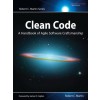Foreword xix
Introduction xxv
On the Cover xxix
Chapter 1: Clean Code 1
There Will Be Code 2
Bad Code 3
The Total Cost of Owning a Mess 4
Schools of Thought 12
We Are Authors 13
The Boy Scout Rule 14
Prequel and Principles 15
Conclusion 15
Bibliography 15
Chapter 2: Meaningful Names 17
Introduction 17
Use Intention-Revealing Names 18
Avoid Disinformation 19
Make Meaningful Distinctions 20
Use Pronounceable Names 21
Use Searchable Names 22
Avoid Encodings 23
Avoid Mental Mapping 25
Class Names 25
Method Names 25
Don't Be Cute 26
Pick One Word per Concept 26
Don't Pun 26
Use Solution Domain Names 27
Use Problem Domain Names 27
Add Meaningful Context 27
Don't Add Gratuitous Context 29
Final Words 30
Chapter 3: Functions 31
Small! 34
Do One Thing 35
One Level of Abstraction per Function 36
Switch Statements 37
Use Descriptive Names 39
Function Arguments 40
Have No Side Effects 44
Command Query Separation 45
Prefer Exceptions to Returning Error Codes 46
Don't Repeat Yourself 48
Structured Programming 48
How Do You Write Functions Like This? 49
Conclusion 49
SetupTeardownIncluder 50
Bibliography 52
Chapter 4: Comments 53
Comments Do Not Make Up for Bad Code 55
Explain Yourself in Code 55
Good Comments 55
Bad Comments 59
Bibliography 74
Chapter 5: Formatting 75
The Purpose of Formatting 76
Vertical Formatting 76
Horizontal Formatting 85
Team Rules 90
Uncle Bob's Formatting Rules 90
Chapter 6: Objects and Data Structures 93
Data Abstraction 93
Data/Object Anti-Symmetry 95
The Law of Demeter 97
Data Transfer Objects 100
Conclusion 101
Bibliography 101
Chapter 7: Error Handling 103
Use Exceptions Rather Than Return Codes 104
Write Your Try-Catch-Finally Statement First 105
Use Unchecked Exceptions 106
Provide Context with Exceptions 107
Define Exception Classes in Terms of a Caller's Needs 107
Define the Normal Flow 109
Don't Return Null 110
Don't Pass Null 111
Conclusion 112
Bibliography 112
Chapter 8: Boundaries 113
Using Third-Party Code 114
Exploring and Learning Boundaries 116
Learning log4j 116
Learning Tests Are Better Than Free 118
Using Code That Does Not Yet Exist 118
Clean Boundaries 120
Bibliography 120
Chapter 9: Unit Tests 121
The Three Laws of TDD 122
Keeping Tests Clean 123
Clean Tests 124
One Assert per Test 130
F.I.R.S.T. 132
Conclusion 133
Bibliography 133
Chapter 10: Classes 135
Class Organization 136
Classes Should Be Small! 136
Organizing for Change 147
Bibliography 151
Chapter 11: Systems 153
How Would You Build a City? 154
Separate Constructing a System from Using It 154
Scaling Up 157
Java Proxies 161
Pure Java AOP Frameworks 163
AspectJ Aspects 166
Test Drive the System Architecture 166
Optimize Decision Making 167
Use Standards Wisely, When They Add Demonstrable Value 168
Systems Need Domain-Specific Languages 168
Conclusion 169
Bibliography 169
Chapter 12: Emergence 171
Getting Clean via Emergent Design 171
Simple Design Rule 1: Runs All the Tests 172
Simple Design Rules 2-4: Refactoring 172
No Duplication 173
Expressive 175
Minimal Classes and Methods 176
Conclusion 176
Bibliography 176
Chapter 13: Concurrency 177
Why Concurrency? 178
Challenges 180
Concurrency Defense Principles 180
Know Your Library 182
Know Your Execution Models 183
Beware Dependencies Between Synchronized Methods 185
Keep Synchronized Sections Small 185
Writing Correct Shut-Down Code Is Hard 186
Testing Threaded Code 186
Conclusion 190
Bibliography 191
Chapter 14: Successive Refinement 193
Args Implementation 194
Args: The Rough Draft 201
String Arguments 214
Conclusion 250
Chapter 15: JUnit Internals 251
The JUnit Framework 252
Conclusion 265
Chapter 16: Refactoring SerialDate 267
First, Make It Work 268
Then Make It Right 270
Conclusion 284
Bibliography 284
Chapter 17: Smells and Heuristics 285
Comments 286
Environment 287
Functions 288
General 288
Java 307
Names 309
Tests 313
Conclusion 314
Bibliography 315
Appendix A: Concurrency II 317
Client/Server Example 317
Possible Paths of Execution 321
Knowing Your Library 326
Dependencies Between Methods Can Break Concurrent Code 329
Increasing Throughput 333
Deadlock 335
Testing Multithreaded Code 339
Tool Support for Testing Thread-Based Code 342
Conclusion 342
Tutorial: Full Code Examples 343
Appendix B: org.jfree.date.SerialDate 349
Appendix C: Cross References of Heuristics 409
Epilogue 411
Index 413

